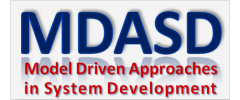Model Driven Approaches in System Development
(MDASD)
For many years, various approaches in system design and implementation differentiate between the specification of the system and its implementation on a particular platform. People in software industry have been using models for a precise description of systems at the appropriate abstraction level without unnecessary details. Model-Driven (MD) approaches to the system development increase the importance and power of models by shifting the focus from programming to modeling activities. Models may be used as primary artifacts in constructing software, which means that software components are generated from models.
In the AI era, MD approaches provide a structured framework for the design, development and optimization of complex systems by creating models that represent different system components, learning algorithms, neural networks and/or other components of a system. At the same time, adaptability is increased as the entire system can be updated quickly without having to rewrite large parts of the code, making it easier to integrate new functions or intelligent components.
A goal of the proposed workshop is to bring together people working on MD approaches, techniques and tools as well as domain-specific modeling (DSM) and domain-specific languages (DSL) and applying them in all aspects of intelligent or other information systems, in order to share their experiences, develop new ideas, evaluate and improve MD approaches, and disseminate their application. The intent is to strive for an interdisciplinary nature of MD approaches in software development, as well as research topics expressed by, but not limited to, acronyms such as Model Driven Software Engineering (MDSE), Model Driven Development (MDD), Domain Specific Modeling (DSM), and OMG's Model Driven Architecture (MDA). Apart from analyzing application perspectives of MD approaches in intelligent systems, another important aspect nowadays that MDASD intends to cover is how to deploy modern AI & ML based approaches in the software process based on a wide spectrum of MD approaches.
Topics
Submissions are expected from, but not limited to the following topics:
- MD Approaches in System Design and Implementation – Problems and Issues
- MD Approaches in Software Process Models, Software Quality and Standards
- MD Approaches in Databases, Information Systems, Embedded and Real-Time Systems
- Metamodeling, Modeling and Specification Languages, Model Transformation Languages
- Model-to-Model, Model-to-Text, and Model-to-Code Transformations in Software Process
- Transformation Techniques and Tools
- Domain Specific Languages (DSL) and Domain Specific Modeling (DSM) in System Specification and Development
- Design of Metamodeling and Modeling Languages and Tools
- MD Approaches in Requirements Engineering, Document Engineering and Business Process Modeling
- MD Approaches in System Reengineering and Reverse Engineering
- MD Approaches in HCI and UX Design, GIS Development, and Cyber-Physical Systems
- Low-Code and No-Code software development – research, experiences and challenges
- Model Based Software Verification
- Artificial Intelligence (AI) for MD and MD for AI-based system development
- Theoretical and Mathematical Foundations of MD Approaches
- Multi-View, Multi-Paradigm and Blended Modeling
- Organizational and Human Factors, Skills, and Qualifications for MD Approaches
- Teaching MD Approaches in Academic and Industrial Environments
- MD Applications, Industry Experience, Case Studies, relationship with IoT and Industry 4.0
- Artificial Intelligence (AI) for MD
- MD for AI-based system development
Thematic Session organizers
- Milašinović, Boris, University of Zagreb, Faculty of Electrical Engineering and Computing, Croatia
- Ristić, Sonja, University of Novi Sad, Faculty of Technical Sciences, Serbia
- Tolvanen, Juha-Pekka, MetaCase, Finland
Submission rules
- Authors should submit their papers as Postscript, PDF or MSWord files.
- The total length of a paper should not exceed 12 pages IEEE style (including tables, figures and references). More pages can be added, for an additional fee. IEEE style templates are available here.
- Papers will be refereed and accepted on the basis of their scientific merit and relevance to the Topical Area.
- Preprints containing accepted papers will be published online.
- Only papers presented at the conference will be published in Conference Proceedings and submitted for inclusion in the IEEE Xplore® database.
- Conference proceedings will be published in a volume with ISBN, ISSN and DOI numbers and posted at the conference WWW site.
- Conference proceedings will be submitted for indexation according to information here.
- Organizers reserve right to move accepted papers between FedCSIS Sessions.
There is a possibility of selecting extended versions of the best papers for further procedure in the journals: ComSIS, ISI IF(2022) = 1.4, and COLA, ISI IF(2022) = 2.2.
History
Important dates
Thematic Session proposal submission: 26.11.2025Paper submission (no extensions): 25.05.2025Position paper submission: 10.06.2025Author notification: 8.07.2025Final paper submission, registration: 15.07.2025Early registration discount: 6.08.2025Conference date: September 14-17.09.2025


















